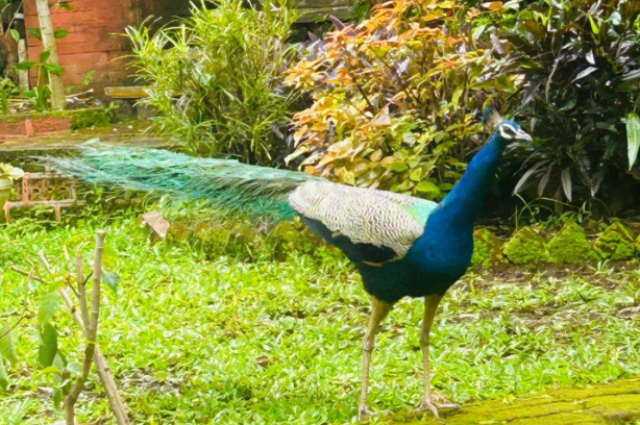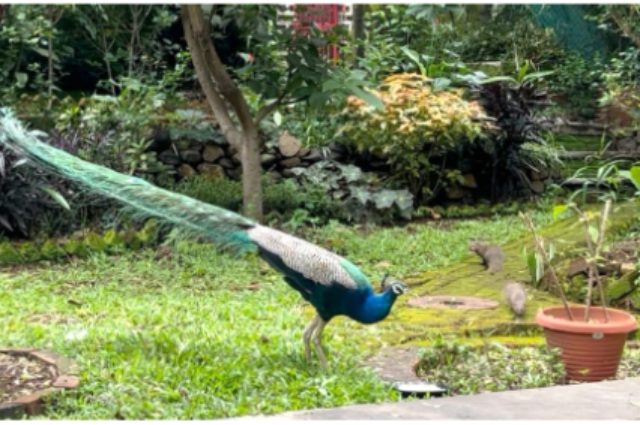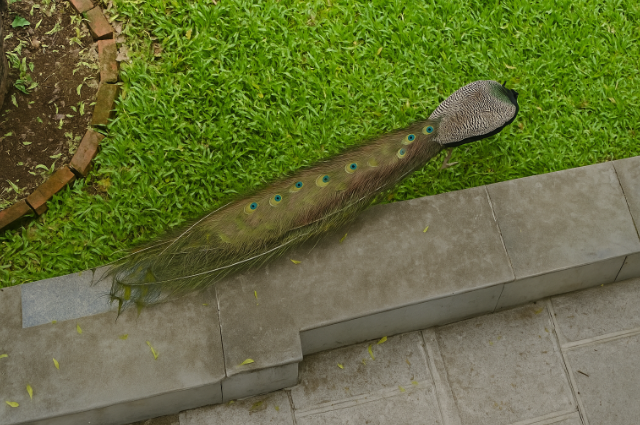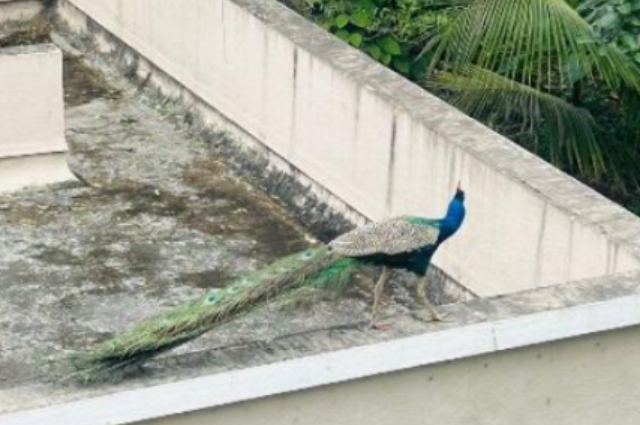
The hill borders our backyard, and we are blessed with a variety of animals. From peacocks to mongooses, and at times even deer, rabbits, and monkeys, to summer snakes, frogs, and the prettiest insects and butterflies—we are in heaven.
Waking up to the sound of peacocks strolling through the forests, or the occasional flight into our backyard, it’s always a new day.
It had been a long time since the peacock, whom I affectionately call Ron, had wandered into our garden. But just yesterday afternoon, as I sat by my window talking to a friend, a surprise unfolded.
It was Ron, with his big, beautiful tail. For a moment, I was startled by his presence, but that royal blue neck caught my eye—a splash of color in an otherwise lush green forest. There he stood, proud and majestic, reminding me that even familiar places can hold unexpected magic.
Ron didn’t rush. He strolled across the grass, pausing now and then as if to admire the garden himself. His feathers shimmered in the sunlight, catching every shade of green and blue around him. I could hear the faint rustle of leaves under his feet, the whisper of wings, and the occasional call that seemed to echo from the hills. It was as if he was reminding me that the world outside our doors is alive, vibrant, and full of stories we often miss.
Watching him, I realized how rare these moments are. In the rush of daily life, it’s easy to overlook the small wonders right outside our windows. But there he was, a living painting, effortlessly blending grace and audacity. Even the other animals in the garden seemed to give him space, acknowledging his royal presence without fear or fuss.
I disconnected the phone and told my friend I’ll call her back, as I was so excited to document his gracious visit. I grabbed my camera, not wanting to disturb him. Capturing Ron on film felt almost like trying to trap a little piece of magic, though I knew no picture could do justice to the vividness of his blue and green feathers, the elegance of his movements, or the sheer presence of his being.
When I called my friend back, she didn’t seem surprised and only said that there is a street in our neighborhood where peacocks come to feed. They seem to be aware of the humans but continue eating without a care in the world. Luckily, people respected them and left them alone. Onlookers admired their beauty as they passed. But as she spoke, there was something still unique about a peacock in your own backyard.
A peacock in your own backyard is special. It’s not something you see every day, unlike the ones you might catch glimpses of on a street, where they blend into the crowd and routine—the backyard visitor feels personal, intimate, almost like a guest who chose to honor you with its presence. The experience is quieter, slower, and far more magical, leaving a memory that lingers long after the bird has returned to the forest.
Peacocks are hard to ignore. They’re loud, proud, and unlike most birds, they don’t try to hide. Whether it’s their harsh call or the sudden flash of color when they open their feathers, they always make their presence felt. Seeing one outside the window feels less like spotting a rare bird and more like being reminded that nature can walk right into our everyday spaces without warning.
For five whole minutes, he wandered all over the garden, as if admiring the beautiful flowers, but at the same time on the lookout for plants to trample and new seeds to peck at. Back and forth, up and down the steps, he moved with a kind of deliberate curiosity that made everything else freeze around him. My parents were upstairs, quietly sipping their afternoon tea by the window, and I found myself urging our maid to keep the clutter down, so Ron could explore without distraction.
The garden suddenly looked smaller as Ron made his way to every inch and corner. His long legs and heavy tail that brushed against every plat when he turned, almost felt like a dance. Just some time back, I had kept food for my mongooses- Millie and mother-daughter duo Kokina and Kiwi. There were some bites left in the plate, and I was sure that Ron would gobble it all up, but to my surprise, he didn’t touch it. “Does he not like rice?” I asked myself. Well, he doesn’t.

At one point, Ron wasn’t alone. Our resident mongoose popped his head out, clearly confused about what this giant blue visitor was doing in his space. For a moment, it looked like a silent standoff—the mongoose watching from the mossy path while Ron pretended not to notice. It was almost comical, like two neighbors bumping into each other and trying to decide who had the right of way. Scenes like this make the backyard feel alive, where every creature, big or small, plays its part in an unscripted drama.

Ron wasn’t content with just the lawn. With a light hop, he made his way up to the terrace. There, he strutted across the open space as though it were his private stage. From that vantage point, he could see the whole neighborhood—trees, rooftops, and the flutter of other birds in the distance. Even without sunlight, his feathers caught the gray light of the cloudy day, the blues and greens still managing to stand out against the plain cement floor. His long tail trailed behind him, brushing the terrace like a sweeping robe. For a few minutes, the ordinary slab of concrete became a royal courtyard.

From the terrace, his tail stretched out neatly over the grass and stone path. The rows of ‘eyes’ on the feathers looked almost arranged, each one catching a different shade of blue and green. Seen from above, it felt less like a bird’s tail and more like a pattern laid out on the garden floor. The sheer length of it was striking—long enough to cover half the yard, yet every feather seemed to stay in place, layered and balanced. Even without the dramatic fan display, the tail itself had a quiet kind of grandeur.
By the time Ron decided to wander back toward the forest, I felt a strange mix of gratitude and longing. The garden felt emptier, quieter, yet somehow fuller, as if his visit had left a mark on the very air.
